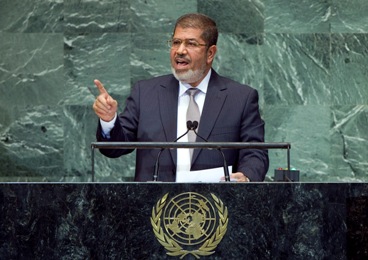Egyptian president criticizes international community for not rewarding Sudan
September 26, 2012 (WASHINGTON) – The newly elected Egyptian president Mohamed Morsi appealed to the international community to provide additional support to Sudan and suggested that the government in Khartoum has not been adequately rewarded despite “great sacrifices” it made.

“Sudan has made great sacrifices in its quest for peace and stability. It has committed itself to the implementation of the Comprehensive Peace Agreement. It was also the first country to recognize the nascent state of south Sudan,” Morsi said.
“But let me be frank: it has not received the support it deserves. The time has come for international efforts to rally to support it and work on settling differences between Sudan and its neighboring South Sudan to resolve all outstanding issues,” the Egyptian leader added.
Morsi appears to be echoing complaints made by Sudanese officials that the international community and particularly western countries have not followed through on promises to lift sanctions and normalize relations with Khartoum as well as provide economic assistance primarily in the form of debt relief.
The United States has pledged to remove Sudan from the list of countries that sponsor terrorism if Khartoum facilitates the January 2011 referendum in which South Sudanese subsequently decided to secede from the Arab Muslim dominated north.
However, Washington later attached additional conditions to the de-listing in the wake of conflicts that broke out in the border states of Blue Nile and South Kordofan and Khartoum’s refusal to allow humanitarian aid into rebel-held areas despite famine warnings by United Nation agencies.
Sudan also wants the west to support a UN Security Council (UNSC) resolution deferring the International Criminal Court (ICC) arrest warrant issued for president Omer Hassan al-Bashir on charges of war crimes, crimes against humanity and genocide allegedly committed in the country’s western region of Darfur.
“Our brothers and sisters in Sudan need, more than ever, your support…..This country seeks to achieve stability and development and works on building healthy ideal relations with South Sudan. I believe that this nascent state, together with Sudan, are ready to become a center of cooperation between the Arab world and African countries” Morsi said in his remarks at the UNGA.
Sudan and South Sudan are currently negotiating post-secession outstanding items such as borders, oil, Abyei, national debt, water, international agreements and citizenship. Progress on these issues has been anemic frustrating African and international mediators.
Tensions over the unmarked 1,800-km (1,200-mile) common border spilled over into fighting in April, when South Sudan’s army briefly occupied the Heglig oilfield, vital to Sudan’s economy.
The UNSC has threatened the two sides with sanctions if no deal is struck on these issues by a set deadline which has twice been extended.
Analysts and decision makers in Sudan have been closely monitoring the direction of the new Egyptian leadership, which came to power in June following this year’s first free elections in decades following the ouster of Morsi’s predecessor Hosni Mubarak in a popular revolution in February 2011.
Today’s speech by Morsi could signal a continuation of Cairo’s policy under Mubarak of backing the Bashir government in the international arena. Some observers have questioned whether post-revolution Egypt will go far enough in its support of Khartoum which stands accused of massive human rights violations and oppressing political opposition.
This month Morsi received Bashir in Cairo despite calls by local and international rights groups to either dis-invite or arrest the Sudanese leader on the basis of the International Criminal Court (ICC) warrant for alleged war crimes committed during the Darfur conflict.
But Egyptian officials brushed aside the appeals and noted the African Union position on the matter as well as Cairo not being a signatory to the Hague court’s Rome Statute.
(ST)
